|
|
|
Sort Order |
|
|
|
Items / Page
|
|
|
|
|
|
|
| Srl | Item |
| 1 |
ID:
172089
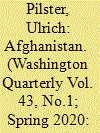

|
|
|
| 2 |
ID:
015989
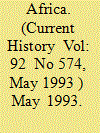

|
|
|
| 3 |
ID:
191041
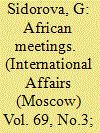

|
|
|
|
|
| Summary/Abstract |
THE myth of the indestructibile primacy of Western countries - former metropolises in world affairs, including on the African continent - is crumbling day by day, proving its groundlessness. The colossus's feet turned out to be clay, unable to stand the test of time. Today, the West is at a loss over Russia's practical steps to strengthen friendly relations with the states of Africa and the East in the name of international security and cooperation for the benefit of all peoples.1.
|
|
|
|
|
|
|
|
|
|
|
|
|
|
|
|
| 4 |
ID:
007320
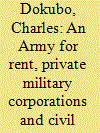

|
|
|
|
|
| Publication |
Summer 2000.
|
| Description |
51-64
|
|
|
|
|
|
|
|
|
|
|
|
|
|
|
|
| 5 |
ID:
054342


|
|
|
| 6 |
ID:
098126


|
|
|
| 7 |
ID:
099370
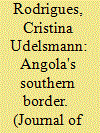

|
|
|
|
|
| Publication |
2010.
|
| Summary/Abstract |
Santa Clara, on Angola's southern border with Namibia, is now a very dynamic urban hub, both economically and socially. It stands out in the remote province of Cunene, recording greater growth in the last five years than the provincial capital, Ondjiva. Its recent transformation into a thriving trading centre was mostly due to massive migration and an intensification of trade between Angola and Namibia at the beginning of this century, although the region's history in the last hundred years is a very different one. While local traders and entrepreneurs have developed their own strategies within this context, national and local administrative structures of the recently pacified country are trying to regulate trading and settlement. These forces in action produce both more sustainable and organised urban growth and at the same time influence social and economic development in the region. The main boom seems to be over, due to relatively successful regulation, which makes the region less attractive to business activity. Traders and entrepreneurs operating locally now have to find new strategies and opportunities. This article, based on empirical research and combined surveys, conducts an analysis of these dynamics and contributes to an understanding of regulation impacts, the way in which local traders cope with them, and the strategies they have developed.
|
|
|
|
|
|
|
|
|
|
|
|
|
|
|
|
| 8 |
ID:
101589
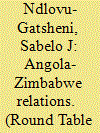

|
|
|
|
|
| Publication |
2010.
|
| Summary/Abstract |
The common approach to the study of foreign policies of Southern African Development Community (SADC) states is to locate them within the context of 'brother presidents' and 'sister liberation movements'. There is emphasis on liberation war camaraderie as a key variable. However, Angola-Zimbabwe (read as MPLA-ZANU-PF and MPLA-MDC) relations have no noticeable strong liberation war-time ties. The relations are traceable to the post-1980 period when the Zimbabwe African National Union-Patriotic Front (ZANU-PF) pursued a deliberate policy of integrating itself within the SADC region and this coincided with the Popular Movement for the Liberation of Angola's (MPLA) long-time desire to isolate its internal enemies of the National Front for the Liberation of Angola and the National Union for the Total Independence of Angola. What is also noticeable is the opacity and ambiguities in Angola-Zimbabwe relations, which have provoked growth of speculation and suspicion. The only time Angola and Zimbabwe openly collaborated was in their intervention in the Democratic Republic of Congo war in 1998 under the auspices of the SADC in general and the SADC Organ on Politics, Defence and Security in particular. However, two recent developments-the state visit to Luanda by the Prime Minister of Zimbabwe and the leader of the Movement for Democratic Change (MDC-T) Morgan Tsvangirai in October 2009, and the announcement by ZANU-PF of the China-Sonangol $8bn investment deal in November 2009-have provoked fresh interest in understanding Angola-Zimbabwe relations in the context of a regional initiative to resolve the Zimbabwe crisis. Although Angola is visible as a member of the SADC in the search for a solution to the Zimbabwe crisis, it has not openly expressed its foreign policy towards Zimbabwe. Unlike Botswana under Ian Khama and Zambia under the late Levy Mwanawasa, which openly criticised President Robert Mugabe and ZANU-PF over governance and its human rights record, Angola has remained quiet, making it hard to know its exact position vis-agrave-vis initiatives towards resolution of the Zimbabwe crisis. Interest in Angolan foreign policy is further motivated by the fact of its ascendancy as one of the regional powers; building on its rich mineral resources, it has the potential leverage to help in the resolution of the Zimbabwe crisis if it openly expressed its position. At the moment, it is not clear whether Angola has also adopted 'quiet diplomacy', just like South Africa under President Thabo Mbeki in its dealings with Zimbabwe.
|
|
|
|
|
|
|
|
|
|
|
|
|
|
|
|
| 9 |
ID:
091696
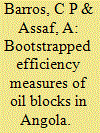

|
|
|
|
|
| Publication |
2009.
|
| Summary/Abstract |
This paper investigates the technical efficiency of Angola oil blocks over the period 2002-2007. A double bootstrap data envelopment analysis (DEA) model is adopted composed in the first stage of a DEA-variable returns to scale (VRS) model and then followed in the second stage by a bootstrapped truncated regression. Results showed that on average, the technical efficiency has fluctuated over the period of study, but deep and ultradeep oil blocks have generally maintained a consistent efficiency level. Policy implications are derived.
|
|
|
|
|
|
|
|
|
|
|
|
|
|
|
|
| 10 |
ID:
097750
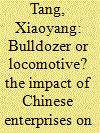

|
|
|
|
|
| Publication |
2010.
|
| Summary/Abstract |
This article is to analyze the impact of Chinese enterprises on the local employment practices in Angola and the Democratic Republic of the Congo (DRC). Based on surveys of over 100 Chinese and local companies and extensive interviews with managers and policy-makers in both countries made from July to December 2007, the study aims not only to depict the current employment practices of Chinese companies in Africa, but also to analyze the factors which affect the localization of employment. Two major patterns, bulldozer-type and locomotive-type, are identified and their implications for the local communities are discussed.
|
|
|
|
|
|
|
|
|
|
|
|
|
|
|
|
| 11 |
ID:
080054


|
|
|
|
|
| Publication |
2007.
|
| Summary/Abstract |
This paper investigates a paradoxical case of business success in one of the world's worst-governed states, Angola. Founded in 1976 as the essential tool of the Angolan end of the oil business, Sonangol, the national oil company, was from the very start protected from the dominant (both predatory and centrally planned) logic of Angola's political economy. Throughout its first years, the pragmatic senior management of Sonangol accumulated technical and managerial experience, often in partnership with Western oil and consulting firms. By the time the ruling party dropped Marxism in the early 1990s, Sonangol was the key domestic actor in the economy, an island of competence thriving in tandem with the implosion of most other Angolan state institutions. However, the growing sophistication of Sonangol (now employing thousands of people, active in four continents, and controlling a vast parallel budget of offshore accounts and myriad assets) has not led to the benign developmental outcomes one would expect from the successful 'capacity building' of the last thirty years. Instead, Sonangol has primarily been at the service of the presidency and its rentier ambitions. Amongst other themes, the paper seeks to highlight the extent to which a nominal 'failed state' can be successful amidst widespread human destitution, provided that basic tools for elite empowerment (in this case, Sonangol and the means of coercion) exist to ensure the viability of incumbents.
|
|
|
|
|
|
|
|
|
|
|
|
|
|
|
|
| 12 |
ID:
162418
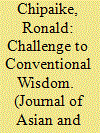

|
|
|
|
|
| Summary/Abstract |
This article makes the point that African states with significant strategic resources and democratic governance systems bargain better in economic and development assistance engagements with China and other partners. In democratic African states, non-state actors play critical complementary roles to the state, leading to multi-faceted forms of African agency. For non-democratic states, a significant limiting factor in their agency is the lack of working relationships between the state and non-state actors. Concomitantly, such states find themselves with weak bargaining and negotiating capacities. If African agency is to be assertive, then state and non-state actors should work together when engaging external partners.
|
|
|
|
|
|
|
|
|
|
|
|
|
|
|
|
| 13 |
ID:
016283
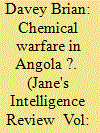

|
|
|
|
|
| Publication |
June 1993.
|
| Description |
280-283
|
|
|
|
|
|
|
|
|
|
|
|
|
|
|
|
| 14 |
ID:
115877
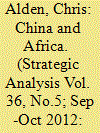

|
|
|
| 15 |
ID:
116347
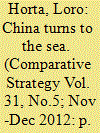

|
|
|
|
|
| Publication |
2012.
|
| Summary/Abstract |
As China's economy continues to expand, its policies and interests change and evolve. Today, Chinese economic and political interests span the globe from Africa to Latin America and the South Pacific. The country has grown more dependent on foreign energy sources in once marginal places such as Angola. Access to resources such as oil and natural gas are now at the forefront of Chinese security policy. While access to markets and regions where massive Chinese investment is occurring is equally important, these new challenges have led to some important changes in China's security and military posture, particularly its naval strategy. While diplomacy and economic power are still the most practical alternatives available to China to defend its interests, several Chinese military and civilian observers now openly discuss other alternatives, such as the eventuality of using military power to defend these interests. This is particularly visible in the People's Liberation Army Navy, where a more ambitious and confident maritime strategy is now being discussed.
|
|
|
|
|
|
|
|
|
|
|
|
|
|
|
|
| 16 |
ID:
119739
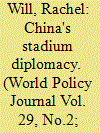

|
|
|
|
|
| Publication |
2012.
|
| Summary/Abstract |
Ten minutes drive from the coastal Angolan city of Benguela, on the edge of what was once an abandoned banana plantation, a massive white steel structure emerges from the surrounding shanties and barren fields. Only a single paved road runs alongside it. Benguela's stadium is one of four built for the 2010 African Cup of Nations, an event designed to showcase Angola's charge toward modernity. The event resembles, on a somewhat reduced scale, the World Cup. But with the barriers Angola needed to hurdle to prepare for its hosting duties, the event may as well have been the Olympics. Only 10 years after a 27-year civil war, much of Angola's national infrastructure remained shattered, with land mines marking conflict zones across its landscape.
|
|
|
|
|
|
|
|
|
|
|
|
|
|
|
|
| 17 |
ID:
110019
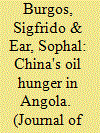

|
|
|
|
|
| Publication |
2012.
|
| Summary/Abstract |
China aims to secure, across the globe, the natural resources and raw materials needed to sustain the rapid economic growth in its manufacturing and industrial sectors. Among the many critical resources needed to fulfill its variegated energy needs, oil is by far the most important one given that it fuels its economic engine. Angola's vast oil reserves and flexible production levels make it a leading producer and exporter of crude oil. It quickly became a strategic oil supplier to China. In 2010, Angola supplied one-quarter of China's oil imports.
|
|
|
|
|
|
|
|
|
|
|
|
|
|
|
|
| 18 |
ID:
106565
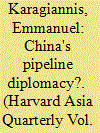

|
|
|
| 19 |
ID:
120108
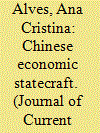

|
|
|
|
|
| Publication |
2013.
|
| Summary/Abstract |
Africa's and South America's rich endowments of resources and great need for infrastructure development make them perfect candidates for China's "infrastructure-for-resources" loans. Over the past decade, such an arrangement for pursuing China's resource-security goals overseas - namely, securing long-term supply contracts and accessing exploration rights - has proved more effective in Africa than in South America. This article discusses the reasons for this regional variation by providing a comparative study of China's economic statecraft in Angola and Brazil, focusing on the deployment of infrastructure-for-oil deals. It argues that the variation in China's energy-security outcomes (long-term supply and access to oil equity) in Angola and Brazil can be attributed mostly to fundamental differences between the institutional structures of each country's oil industry. Although this foreign policy instrument has worked well for the centralised structure encountered in Angola, it has been less suitable for the far more liberalised and regulated environment that characterises Brazil's oil sector.
|
|
|
|
|
|
|
|
|
|
|
|
|
|
|
|
| 20 |
ID:
117648
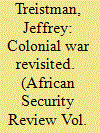

|
|
|
|
|
| Publication |
2012.
|
| Summary/Abstract |
The Carnation Revolution on 25 April 1974 toppled the authoritarian regime in Lisbon. It is fallacious to conclude, however, that the 1974 coup d'état signaled Portugal's defeat in the Colonial War. The status of each conflict on the eve of the Carnation Revolution varied, and it was by no means inevitable that Portugal would have been defeated in all three theatres had the coup not occurred. This brief research note therefore advances a novel approach to examining the Colonial War by assessing the outcomes prior to the 1974 coup. In particular, the author proposes that Portugal achieved military victory in Angola and Mozambique, but was defeated in Guinea-Bissau.
|
|
|
|
|
|
|
|
|
|
|
|
|
|
|
|
|
|
|
|
|